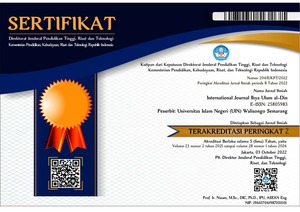Redeveloping Peace in Contemporary Islam
DOI:
https://doi.org/10.21580/ihya.20.1.2766Keywords:
Islam, Peace, Rahmatan lil ‘alaminAbstract
There has been a long debate when it comes to understanding the meaning of Islam. The proponents of Islam claim Islam as a religion of peace, while on the other hand, who are mostly Westerners, would dissent this claim by addressing jihad as a violent product of Islam. The Westerners certainly fail to grasp the spirit of peace in Islam because very often their argumentations are based on material events instead of philosophical approach. This paper is an effort to shed light the true meaning of Islam by analyzing it from its philosophical aspects. Literal interpretations are specifically used as a method to analyze texts in the Quran and the Hadith to reveal the etymological, epistemological, and ontological meanings of Islam. Additionally, Max L. Stackhouse’s normativity ethical approach is utilized as a framework to analyze the meaning of Islam from its textual and contextual doctrines. Three prominent concepts (true-false, good-bad, and appropriate-inappropriate) of normativity ethical approach are used in particular to reveal the spirit of peace towards the meaning of Islam. The conclusion derived from the etymological and epistemological analyses is that Islam means obedience, subjugation, and submission to God as an effort to seek safety and happiness in the world and the world after. The ontological analysis shows that Islam is a religion of peace in which its two principal teachings are believing in Allah and nurturing unity and friendship among the mankind. Islam is hoped to be comprehended as a religion that is friendly and becomes rahmatan lil alamin. The analysis using Stackhouse’s normativity ethical approach focuses on the term jihad which is mean restraining from wars. When it comes to wars, jihad must be done with the spirit to erase oppression, enforce the freedom of belief, and disseminate the message of peace. Eventually, jihad itself is the manifestation of peace which is truly the spirit of IslamDownloads
References
Al-Asymawi, Muhammad Said. 1987. “Al-Islam as-Siyasi.”
Al-Bukhārī, Abū Abdullāh Muḥammad bin Ismā’īl bin Ibrāhim bin al-Mughīrah bin Barzdabah. 1401. Ṣaḥīḥ Al-Bukhārī. Beirut: Dār al-Fikr.
Al-Thabari, Muhammad Ibnu Jarir. 2001. Jami’ Al-Bayan. Kairo: Hajar.
Al-Zamakhsyari, Mahmud ibn ’Umar. 1998. Al-Kasysyaf. Kairo: Maktabat al-’Abikan.
Ali, Abdullah Yusuf. 1993. Qur’an Terjemah Dan Tafsirnya. ed. Translator Ali Audah. Jakarta: Pustaka Firdaus.
Ali, Maulana Muhammad. 1980. Islamologi (Dinul Islam). Jakarta: Ikhtiar Baru van Hoeve.
Azra, Azyumardi. 1996. Pergolakan Politik Islam: Dari Fundamentalisme, Modernisme, Hingga Post-Modernisme. Jakarta: Paramadina.
Baneth, D Z H. 1989. “Apakah Yang Dimaksud Muhammad Saw Dengan Menamakan Agamanya Islam.” In Pandangan Terhadap Islam Lama, eds. HL Beck and NJG Kaptein. Jakarta: INIS.
Brazier, Chris. 2010. The Rises and Rise of Religion, in The No-Nonsense Guide to World History. London and New York: Verso.
Departemen Agama Republik Indonesia. 2015. Al-Qur’an Dan Terjemahnya. Bandung: CV. Darus Sunnah.
Frye, R N. 1993. “The Political History of Iran under the Sassanians.” In The Cambridge History of Iran, ed. William Bayne Fisher. Cambridge: Cambridge University Press.
Hamka. 1981. Tafsir Al-Azhar. ed. XIX. Jakarta: Pustaka Panjimas.
Khadduri, Majid. 1955. War and Peace in the Law of Islam. Baltimore: John Hopkins Press.
Khan, Majid Ali. 1985. Muhammad Saw Rasul Terakhir. ed. Fathul Umam. Bandung: Pustaka.
Madjid, Nurcholish. 1992. Islam Doktrin Dan Peradaban: Sebuah Telaah Kritis Tentang Masalah Keimanan, Kemanusiaan, Dan Kemodernan. Jakarta: Paramadina.
Muhammad, K.H.Husein. 2006. Spiritualitas Kemanusiaan: Perspektif Islam Pesantren. Yogyakarta: Pustaka Rihlah.
Munawar-Rahman, Budhy. 2012. 2 Ensiklopedi Nurcholish Madjid: Pemikiran Islam Di Kanvas Peradaban. Jakarta: Democracy Project.
Nasution, Harun. 1985. Islam Ditinjau Dari Berbagai Aspeknya. Jakarta: UI Press.
Nata, Abudin. 2000. Metodologis Studi Islam. IV. Jakarta: PT Raja Grafindo Persada.
Peters, Rudolph. 1977. Jihad in Medieval and Modern Islam: The Chapter on Jihad from Averroes’ Legal Handbook Bidayat Al-Mujtahid. Leiden: Brill Academic Pub.
Qardhawi, Yusuf. 2010. Fiqih Jihad: Sebuah Karya Monumental Terlengkap Tentang Jihad Menurut Al-Qur’an Dan Sunnah. ed. Irfan Maulana Hakim. Bandung: Mizan.
Razak, Nasruddin. 1977. Dienul Islam. II. Bandung: Al-Maarif.
Saidurrahman. 2012. “Fiqh Jihad DanTerorisme.” Jurnal Ilmu Syariah dan Hukum Asy-Syir’ah 46(1).
Sardar, Ziaduddin and Merryl Wyne Davies. 1992. Wajah-Wajah Islam. ed. A.E. Priyonoand Ade Armando. Bandung: Mizan.
Stackhouse, Max L. 1972. Ethics and The Urban Ethos: An Essay in Social Theory and Theological Reconstruction. Boston: Beacon Press.
Syamsu, Nazwar. 1982. Kamus Al-Qur’an. Jakarta: Ghalia Indonesia.
Syamsuddin, Sahiron. 2012. “Pesan Damai Di Balik Seruan Jihad.” In Islam, Tradisi, Dan Peradaban, Yogyakarta: Bina Mulia Press.
———. 2014. “Contemporary Exegetical Schools.” PowerPoint Lecture, the Study of the Quran and the Hadith Class Concentration on Islamic Political and Governmental Study Program of Study on Islamic Law the Graduate School.
Tim Penerjemah Al-Qur’an Kementerian Agama RI. 2012. Al-Qur’an Dan Tafsirnya. Jakarta: PT Sinergi Pustaka.
Downloads
Published
How to Cite
Issue
Section
License
By submitting an article to the journal, the author(s) agree to transfer the published article's copyright to the journal, which will act as the publisher. This means the journal will have the right to publish the article in various forms, including reprints. The journal will maintain the publishing rights to the published articles.
This work is licensed under Creative Commons Attribution-ShareAlike 4.0 International License.
In line with the license, authors and third parties (readers, researchers, and others) are allowed to share and adapt the material. In addition, the material must be given appropriate credit, provided with a link to the license, and indicated if changes were made. If authors remix, transform or build upon the material, authors must distribute their contributions under the same license as the original.



